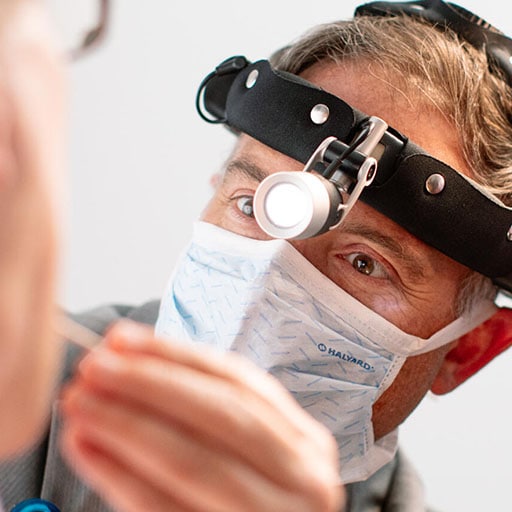Checking out the Area of Otolaryngology: What to Expect When You Consult an ENT
Otolaryngology, frequently described as ENT, encompasses the medical diagnosis and treatment of nose, ear, and throat problems. For those experiencing relevant concerns, consulting an ENT specialist can provide clearness and relief. Comprehending what to anticipate during such appointments is crucial for effective interaction and care. This summary will certainly detail vital facets of the ENT experience, including typical reasons for gos to and the procedures associated with diagnosis and therapy.

Understanding Otolaryngology: A Summary
Otolaryngology, often described as ENT (Ear, Nose, and Throat) medicine, is a specialized branch of medicine that concentrates on the diagnosis and treatment of conditions affecting these important areas of the human body. This area encompasses a wide variety of disorders, including those related to hearing, equilibrium, breathing function, and speech. Otolaryngologists are educated to manage both surgical and clinical therapies, using innovative strategies and modern technologies. Their experience prolongs beyond traditional disorders, attending to concerns such as allergic reactions, sinus infections, and hearing loss. In addition, they play a critical function in the management of head and neck cancers, providing comprehensive treatment customized to specific person needs. On the whole, otolaryngology remains vital for maintaining health and lifestyle in damaged individuals.
Usual Factors to See an ENT Specialist
Several people seek the proficiency of an ENT professional for a range of reasons, reflecting the varied nature of problems that impact the throat, nose, and ear. Typical problems consist of persistent sinusitis, which typically results in relentless nasal blockage and facial pain. Allergic reactions and their associated signs and symptoms, such as itching and sneezing, also trigger brows through to these professionals (Otolaryngologist). Hearing loss, whether progressive or abrupt, is one more substantial factor for appointment. Furthermore, individuals might look for evaluation for throat conditions, consisting of persistent hoarseness or ingesting problems. Rest apnea, defined by interrupted breathing during sleep, is frequently dealt with by ENT experts. Each of these problems highlights the significance of specialized treatment in managing intricate ENT-related health problems
Preparing for Your ENT Appointment
When preparing for an ENT appointment, it is important to gather relevant information and consider any type of details concerns. Patients should put together an in-depth clinical history, consisting of previous ear, nose, or throat concerns, surgeries, and present medications. Recording signs-- such as frequency, intensity, and period-- can provide beneficial understandings for the ENT expert. Additionally, people must prepare a checklist of inquiries they want to ask, making sure that all issues are attended to throughout the check out. Bringing along any type of relevant medical documents or examination outcomes can further help the ENT in comprehending the person's problem. Ultimately, people must validate their visit information, including time, date, and area, to lessen any type of last-minute complication. Appropriate preparation can improve the efficiency of the examination and result in far better end results.
What to Anticipate During the Appointment
As the appointment starts, the client can anticipate to take part in a complete discussion with the ENT specialist concerning their symptoms and medical background. The professional will inquire concerning the duration, regularity, and severity of signs and symptoms such as hearing loss, nasal blockage, or sore throat. In addition, the patient's previous clinical conditions, drugs, and any kind of appropriate over here family history will certainly be examined, assisting the professional in creating a full understanding of the client's health and wellness. The ENT might also inquire about way of living factors, such as exposure to irritants or allergens. This open dialogue establishes a structure for the consultation, making certain that the individual's issues are dealt with and establishing the stage for any necessary analyses or referrals for treatment.
Diagnostic Tests and Procedures in Otolaryngology
A variety of diagnostic tests and treatments are essential in otolaryngology to precisely examine and diagnose conditions impacting the ear, nose, and throat. Usual tests include audiometry, which determines hearing function, and tympanometry, assessing center ear pressure. Nasal endoscopy allows visualization of the nasal passages and sinuses, while laryngoscopy analyzes the throat and vocal cords. Imaging strategies, such as CT scans and MRIs, supply in-depth views of head and neck structures. Allergic reaction screening may likewise be conducted to recognize triggers for sinus or respiratory system issues. These diagnostic tools make it possible for ENT experts to Full Article create a thorough understanding of clients' problems, making certain customized and effective management plans. Correct diagnosis is necessary for successful treatment outcomes in otolaryngology.
Therapy Choices Used by ENT Specialists
ENT professionals use a range of therapy choices customized to deal with specific problems impacting the throat, ear, and nose. These therapies range from conservative strategies, such as medicine and lifestyle alterations, to even more intrusive procedures. For example, allergies may be managed with antihistamines or immunotherapy, while chronic sinus problems could need nasal corticosteroids or sinus surgery. For hearing loss, ENT professionals typically advise listening devices or medical treatments like cochlear implants. In instances of throat conditions, alternatives can consist of speech therapy or procedures to eliminate obstructions. In addition, they might supply support for handling rest apnea, including making use of CPAP gadgets or medical treatments. In general, the goal is to enhance individuals' lifestyle via personalized care and effective therapy techniques.
When to Look For Follow-Up Care With an ENT
Identifying when to seek follow-up treatment with an ENT professional is important for handling recurring symptoms or issues associated with nose, ear, and throat conditions. Patients should think about arranging a follow-up visit if signs continue despite initial therapy, such as persistent ear pain, nasal blockage, or throat pain. Adjustments in hearing, equilibrium concerns, or unusual nasal discharge might also call for additional evaluation. In addition, if a person experiences adverse effects from prescribed medications or has gone through an operation, follow-up care is essential to monitor recuperation and address any kind of concerns. Timely consultations can assure effective management of problems, avoid prospective issues, and supply tranquility of mind relating to one's wellness. Seeking follow-up treatment advertises aggressive wellness monitoring in otolaryngology.
Often Asked Concerns

What Certifications Should I Look for in an ENT Expert?
When looking for an ENT specialist, one our website must look for board qualification, relevant experience, and strong patient testimonials. Furthermore, effective interaction abilities and a compassionate method can significantly enhance the total treatment experience.
How Do I Select the Right ENT for My Needs?
Choosing the right ENT expert involves reviewing their qualifications, experience, and individual reviews (ENT surgery). It is necessary to contemplate their communication design and technique to treatment, ensuring they straighten with the person's details wellness needs and choices
Exist Any Risks Related To ENT Procedures?
The threats connected with ENT treatments might consist of infection, blood loss, anesthetic issues, and possible damages to surrounding structures. Patients must go over these risks with their medical professional to comprehend private worries and guarantee educated decisions.
Just How Can I Handle Anxiousness Prior To My ENT Consultation?
To handle anxiousness before a consultation, people can exercise deep breathing exercises, imagine favorable end results, prepare inquiries beforehand, and seek support from friends or family, cultivating a sense of reassurance and calmness.
What Should I Do if I Experience Side Impacts From Treatment?
The person needs to immediately report them to their medical care company if side effects from treatment take place. Changes to treatment or added interventions may be necessary to assure safety and security and effectiveness in handling their condition - Voice. As the appointment begins, the client can anticipate to engage in an extensive conversation with the ENT expert regarding their signs and symptoms and medical history. These analysis tools enable ENT professionals to develop a comprehensive understanding of individuals' conditions, ensuring tailored and efficient management plans. ENT experts offer a selection of treatment alternatives customized to attend to certain conditions impacting the ear, throat, and nose. When looking for an ENT professional, one ought to look for board qualification, appropriate experience, and solid person reviews. Selecting the best ENT professional involves assessing their credentials, experience, and patient reviews